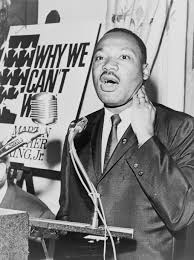Letter to the Editor: Matteo Pagano responds to “I went to a peaceful protest-it was a sign of hope in a deteriorating America”

June 1, 2020
Dear Editors,
In 1963, MLK wrote in his now famous “Letter from a Birmingham Jail” a quote which I feel is very relevant to how we as citizens of the United States decide to respond to these historic cries for an end to racial injustice:
“I must make two honest confessions to you, my Christian and Jewish brothers. First, I must confess that over the past few years I have been gravely disappointed with the white moderate. I have almost reached the regrettable conclusion that the Negro’s great stumbling block in his stride toward freedom is not the White Citizen’s Counciler or the Ku Klux Klanner, but the white moderate, who is more devoted to “order” than to justice; who prefers a negative peace which is the absence of tension to a positive peace which is the presence of justice; who constantly says: “I agree with you in the goal you seek, but I cannot agree with your methods of direct action”; who paternalistically believes he can set the timetable for another man’s freedom; who lives by a mythical concept of time and who constantly advises the Negro to wait for a “more convenient season.” Shallow understanding from people of good will is more frustrating than absolute misunderstanding from people of ill will. Lukewarm acceptance is much more bewildering than outright rejection.
I had hoped that the white moderate would understand that law and order exist for the purpose of establishing justice and that when they fail in this purpose they become the dangerously structured dams that block the flow of social progress. I had hoped that the white moderate would understand that the present tension in the South is a necessary phase of the transition from an obnoxious negative peace, in which the Negro passively accepted his unjust plight, to a substantive and positive peace, in which all men will respect the dignity and worth of human personality. Actually, we who engage in nonviolent direct action are not the creators of tension. We merely bring to the surface the hidden tension that is already alive. We bring it out in the open, where it can be seen and dealt with. Like a boil that can never be cured so long as it is covered up but must be opened with all its ugliness to the natural medicines of air and light, injustice must be exposed, with all the tension its exposure creates, to the light of human conscience and the air of national opinion before it can be cured.”
Another incredibly apt quote comes from his 1967 speech at Stanford University:
“Certain conditions continue to exist in our society, which must be condemned as vigorously as we condemn riots. But in the final analysis, a riot is the language of the unheard. And what is it that America has failed to hear? It has failed to hear that the plight of the Negro poor has worsened over the last few years. It has failed to hear that the promises of freedom and justice have not been met. And it has failed to hear that large segments of white society are more concerned about tranquility and the status quo than about justice, equality and humanity. And so in a real sense our nation’s summers of riots are caused by our nation’s winters of delay. And as long as America postpones justice, we stand in the position of having these recurrences of violence and riots over and over again. Social justice and progress are the absolute guarantors of riot prevention”
In order to actually bring about a change in our world, we have to focus first on the injustices that have led to such unprecedented social unrest. Nobody wants to live through riots. Nobody wants to see their community torn apart by collateral damage that could have been avoided. But to critique the methods of these protests as unruly and “counterproductive”–to shift the blame away from us who have contributed to the postponement of racial justice and onto those who are now caught up in the fight for change–only serves to support the “white moderate” narrative that these protests will never bring about change. We, the citizenry of the United States, decide how to respond to injustice: so will we simply dismiss these protests on the prescription that they are uncivil and anarchistic, or will we finally accept our mistakes, listen to the cries of the unheard, and address the epidemic of police brutality and racial injustice in our country.
I implore you to consider how the message of this article–and, further, any opinion you decide to voice on this national issue–supports the cause you believe in.


